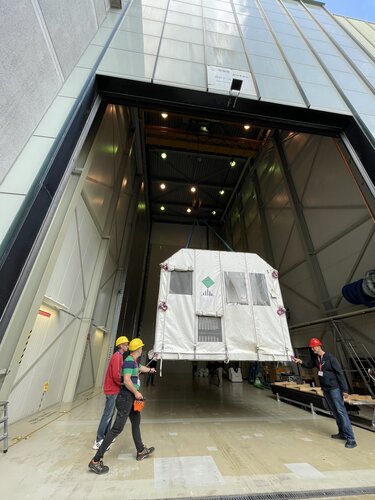
Copernical Team
Hera asteroid mission here
 Image:
Hera asteroid mission here
Image:
Hera asteroid mission here Thermometer molecule confirmed on exoplanet WASP-31b
 Chromium hydride (CrH), a molecule that's relatively rare and particularly sensitive to temperature, is useful as a "thermometer for stars," according to astronomer Laura Flagg, because it's abundant only in a narrow range between 1,200-2,000 degrees Kelvin.
Flagg, a research associate in astronomy in the College of Arts and Sciences (A&S), has used this and other metal hydrides to determi
Chromium hydride (CrH), a molecule that's relatively rare and particularly sensitive to temperature, is useful as a "thermometer for stars," according to astronomer Laura Flagg, because it's abundant only in a narrow range between 1,200-2,000 degrees Kelvin.
Flagg, a research associate in astronomy in the College of Arts and Sciences (A&S), has used this and other metal hydrides to determi Newly discovered planet has longest orbit yet detected by the TESS mission
 Of the more than 5,000 planets known to exist beyond our solar system, most orbit their stars at surprisingly close range. More than 80 percent of confirmed exoplanets have orbits shorter than 50 days, placing these toasty worlds at least twice as close to their star as Mercury is to our sun - and some, even closer than that.
Astronomers are starting to get a general picture of these plane
Of the more than 5,000 planets known to exist beyond our solar system, most orbit their stars at surprisingly close range. More than 80 percent of confirmed exoplanets have orbits shorter than 50 days, placing these toasty worlds at least twice as close to their star as Mercury is to our sun - and some, even closer than that.
Astronomers are starting to get a general picture of these plane LRO data helping NASA prepare for Artemis astronauts on the Moon
 When astronauts set off for a trip around the Moon in 2024 with NASA's Artemis II mission, they will go primed with knowledge of lunar landmarks gathered by one of the Agency's premiere robotic missions to our nearest cosmic neighbor. NASA's Lunar Reconnaissance Orbiter (LRO), launched in 2009, has returned a treasure trove of scientific data in its fourteen years of operation, but this is not a
When astronauts set off for a trip around the Moon in 2024 with NASA's Artemis II mission, they will go primed with knowledge of lunar landmarks gathered by one of the Agency's premiere robotic missions to our nearest cosmic neighbor. NASA's Lunar Reconnaissance Orbiter (LRO), launched in 2009, has returned a treasure trove of scientific data in its fourteen years of operation, but this is not a Photocatalytic CO2 conversion for artificial carbon cycle at extraterrestrial sites
 Today, space missions mainly rely on the transportation of basic needs from the Earth, which is extremely challenging and logistically impossible when we aim to develop stations or habitats on extraterrestrial sites such as the Moon and Mars.
For example, an astronaut needs almost a kilogram of oxygen per day to sustain their life. Therefore, tons of oxygen have to be transported to build
Today, space missions mainly rely on the transportation of basic needs from the Earth, which is extremely challenging and logistically impossible when we aim to develop stations or habitats on extraterrestrial sites such as the Moon and Mars.
For example, an astronaut needs almost a kilogram of oxygen per day to sustain their life. Therefore, tons of oxygen have to be transported to build SwRI will lead Hubble, Webb observations of Io, Jupiter's volcanic moon
 The Space Telescope Science Institute recently awarded Southwest Research Institute a large project to use the Hubble and James Webb telescopes to remotely study Io, the most volcanically active body in the solar system. The study will complement the upcoming flybys of the Jupiter moon by NASA's Juno spacecraft and will provide insights into Io's contributions to the plasma environment around Ju
The Space Telescope Science Institute recently awarded Southwest Research Institute a large project to use the Hubble and James Webb telescopes to remotely study Io, the most volcanically active body in the solar system. The study will complement the upcoming flybys of the Jupiter moon by NASA's Juno spacecraft and will provide insights into Io's contributions to the plasma environment around Ju Infospectrum expands Spire Global contract to enhance vessel-tracking capabilities
 Infospectrum has expanded its agreement with Spire Global, Inc. (NYSE: SPIR) is seto to acquire historical vessel-tracking data in addition to port event information.
The maritime analytics market is expected to be over $2 billion by 2028. Spire's historical automatic identification system (AIS) data and Port Events solution - which supplies live and historical vessel arrival and departure
Infospectrum has expanded its agreement with Spire Global, Inc. (NYSE: SPIR) is seto to acquire historical vessel-tracking data in addition to port event information.
The maritime analytics market is expected to be over $2 billion by 2028. Spire's historical automatic identification system (AIS) data and Port Events solution - which supplies live and historical vessel arrival and departure Mars helicopter Ingenuity completes 56th flight
 Ingenuity, the tiny helicopter that has far surpassed expectations on Mars, has completed its 56th flight, NASA's Jet Propulsion Lab announced Thursday.
Ingenuity flew 1,334 feet, a little over a quarter of a mile, across the Martian surface last Saturday, JPL said in a statement. The tiny chopper flew at a maximum altitude of about 39 feet above the surface of the Red Planet.
"The goal of this
Ingenuity, the tiny helicopter that has far surpassed expectations on Mars, has completed its 56th flight, NASA's Jet Propulsion Lab announced Thursday.
Ingenuity flew 1,334 feet, a little over a quarter of a mile, across the Martian surface last Saturday, JPL said in a statement. The tiny chopper flew at a maximum altitude of about 39 feet above the surface of the Red Planet.
"The goal of this BlackSky images complex evacuation operation during first days of 2023 Sudan conflict
 BlackSky Technology Inc. (NYSE: BKSY) released a sixty-image collection captured over Khartoum, Sudan, showcasing the never-before-seen scale of operational complexity associated with the evacuation of international civilians and key personnel from Wadi Sayyidna Airfield from late April until early May. The image collection contains high-cadence, time-diverse imagery taken as early as 5:37 a.m.,
BlackSky Technology Inc. (NYSE: BKSY) released a sixty-image collection captured over Khartoum, Sudan, showcasing the never-before-seen scale of operational complexity associated with the evacuation of international civilians and key personnel from Wadi Sayyidna Airfield from late April until early May. The image collection contains high-cadence, time-diverse imagery taken as early as 5:37 a.m., Preventing outer space from becoming a hazardous junkyard

As the number of objects launched into orbit grows, the EU is working to prevent debris from getting out of hand.
An upsurge in worldwide rocket and satellite launches into space means collisions are an increasing danger that EU research projects are seeking to curb.
The number of satellites in space may exceed 100,000 by 2030, according to forecasts. Small satellites are increasingly being sent into low orbits 500 to 1,000 kilometers above Earth to do everything from improve remote communications to guide driverless cars.
Collision alarm
"There is an increasing amount of debris in space," said Anthony Caron, future programs manager at a French space-observation company called Share My Space. "More and more debris implies more and more collision probability—and the problem is real now. There are lots of events where you have to perform maneuvers to avoid collisions.

